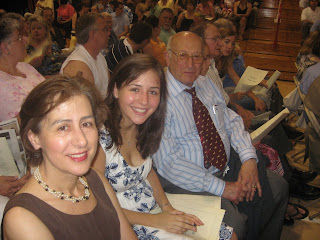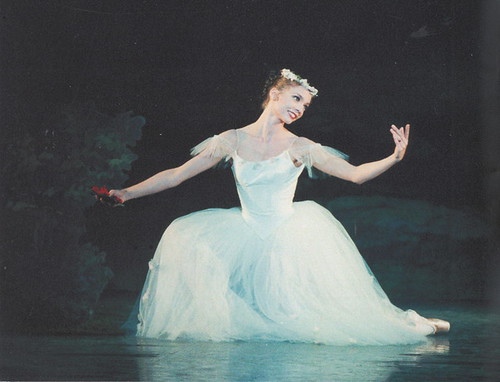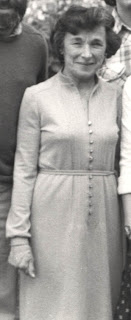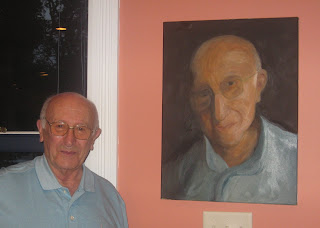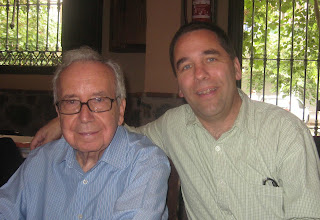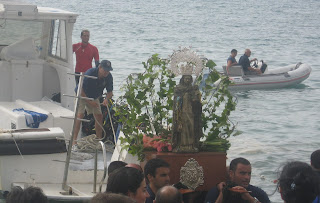

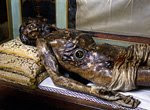 On Tuesday morning, after leaving Daniela off at the ballet school, Pili, Asun and I went to center Madrid. After getting Asun's train ticket for Sunday (Madrid-Malaga in 2:25!), we decided to go see the Convent of the Descalzas Reales, which I had never visited. Impressive! The convent was established in 1559 in a fifteenth century building that had served as a palace for one of Charles I's (The Emperor Charles V) officials. The nuns were, and still are, of the Poor Clares order (Clarisas franciscanas), devoted to contemplation and prayer. Today 22 nuns live here. In the sixteenth and seventeenth centuries, the nuns who came to this convent were daughters of royalty, so they brought some serious wealth with them. And thus we have a building that houses an extraordinary collection of renaissance and baroque art, including a Titian. One of the works that most got my attention was the sculpture of Christ shown above. This is a sixteenth century work by Andalusian artist Gaspar Becerra, done in polychromed wood. The blood and suffering is over the top (nothing new in Mel Gibson's ridiculous film), but that's been seen a lot. What's really curious is the door in his chest. This is a little tabernacle, the place where the host is stored! (And by special permission dating from the convent's foundation, this Christ figure is carried in procession on Good Friday with the host inside it! That seems to contradict everything I learned in catechism, but what do I know.) Wow, this Becerra really took the Counterreformation to heart: the body of Christ–you don't believe it? See, the priest is reaching right into his chest and bringing out some body. Eat! Among the many wonderful paintings in the convent, one that stood out for me is the portrait by Antonio Rizi of Princess Margaret of Austria, daughter of Philip IV. She's the famous infanta so beautifully captured in the center of Las Meninas. Such a cute little girl and look what happened to her! She's buried in the convent's main chapel, but we were unable to visit the tomb, as the nuns must have been in there. (Note [1/07/09]): This is WRONG. I confused the dear little princess with an earlier relative, another Princess Margaret, this one the daughter of Queen María, widow of the Emperor Maximillian II. The Margarita who ended up in this convent was the 14th of 15 children! She lived approximately a century before the Margarita so wonderfully painted by Velazquez.) Finally, there is an incredible Dolorosa by the great Andalusian sculptor Pedro de Mena, who did important works for the Cathedral and convents in Malaga. This bust is a single piece of sculpted wood. The expression is magnificent and the red hues under her eyes, so suggestive of intense crying, are so realistic it took my breath away. I literally had to turn my head. Don't cry, it's ok!, I wanted to implore. This baroque art is not subtle in terms of working on the emotions. Forget theology, feel it! It was a great visit and I wished we could have seen the chapel and some of the other private areas. We then had a nice lunch in Malasaña. Asun and I had a little 'trip down memory lane', going by the place where we met, the building where I was living, bars we visited, etc. The neighborhood has changed tremendously, but it was great fun nonetheless. Twenty-six years! That's how long ago we met. Beautiful! Give me twenty-six more, please.
On Tuesday morning, after leaving Daniela off at the ballet school, Pili, Asun and I went to center Madrid. After getting Asun's train ticket for Sunday (Madrid-Malaga in 2:25!), we decided to go see the Convent of the Descalzas Reales, which I had never visited. Impressive! The convent was established in 1559 in a fifteenth century building that had served as a palace for one of Charles I's (The Emperor Charles V) officials. The nuns were, and still are, of the Poor Clares order (Clarisas franciscanas), devoted to contemplation and prayer. Today 22 nuns live here. In the sixteenth and seventeenth centuries, the nuns who came to this convent were daughters of royalty, so they brought some serious wealth with them. And thus we have a building that houses an extraordinary collection of renaissance and baroque art, including a Titian. One of the works that most got my attention was the sculpture of Christ shown above. This is a sixteenth century work by Andalusian artist Gaspar Becerra, done in polychromed wood. The blood and suffering is over the top (nothing new in Mel Gibson's ridiculous film), but that's been seen a lot. What's really curious is the door in his chest. This is a little tabernacle, the place where the host is stored! (And by special permission dating from the convent's foundation, this Christ figure is carried in procession on Good Friday with the host inside it! That seems to contradict everything I learned in catechism, but what do I know.) Wow, this Becerra really took the Counterreformation to heart: the body of Christ–you don't believe it? See, the priest is reaching right into his chest and bringing out some body. Eat! Among the many wonderful paintings in the convent, one that stood out for me is the portrait by Antonio Rizi of Princess Margaret of Austria, daughter of Philip IV. She's the famous infanta so beautifully captured in the center of Las Meninas. Such a cute little girl and look what happened to her! She's buried in the convent's main chapel, but we were unable to visit the tomb, as the nuns must have been in there. (Note [1/07/09]): This is WRONG. I confused the dear little princess with an earlier relative, another Princess Margaret, this one the daughter of Queen María, widow of the Emperor Maximillian II. The Margarita who ended up in this convent was the 14th of 15 children! She lived approximately a century before the Margarita so wonderfully painted by Velazquez.) Finally, there is an incredible Dolorosa by the great Andalusian sculptor Pedro de Mena, who did important works for the Cathedral and convents in Malaga. This bust is a single piece of sculpted wood. The expression is magnificent and the red hues under her eyes, so suggestive of intense crying, are so realistic it took my breath away. I literally had to turn my head. Don't cry, it's ok!, I wanted to implore. This baroque art is not subtle in terms of working on the emotions. Forget theology, feel it! It was a great visit and I wished we could have seen the chapel and some of the other private areas. We then had a nice lunch in Malasaña. Asun and I had a little 'trip down memory lane', going by the place where we met, the building where I was living, bars we visited, etc. The neighborhood has changed tremendously, but it was great fun nonetheless. Twenty-six years! That's how long ago we met. Beautiful! Give me twenty-six more, please.